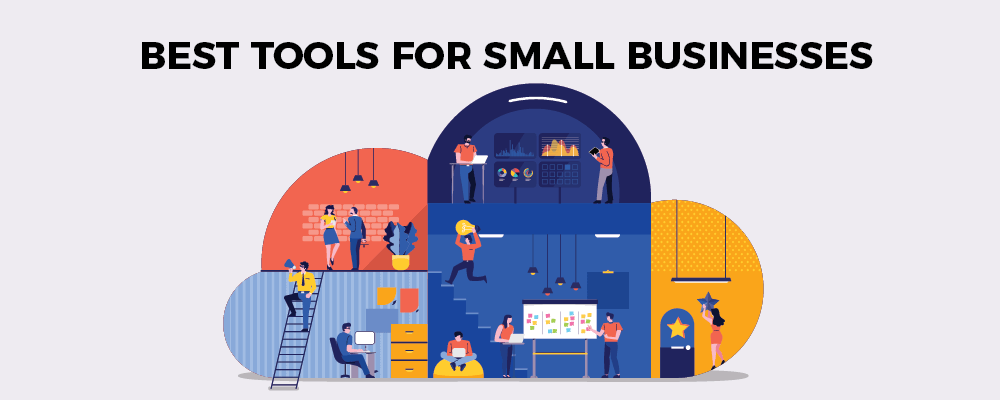
Managing a small business efficiently can be tough, especially with limited resources. Did you know that 40% of small business owners struggle to manage their time effectively? But fear not! In today’s digital age, a wealth of free tools are available to help. In fact, 90% of small businesses use at least one digital tool to manage their operations. This article will explore tools to help small businesses thrive without breaking the bank.
Why Do You Need Small Business Tools?
Small businesses often operate with limited manpower and resources, making it essential to maximize efficiency and productivity. Business tools are crucial in achieving these goals by automating repetitive tasks, organizing workflows, and providing valuable insights into business operations. Whether it’s managing finances, communicating with team members, or marketing products and services, the right tools can significantly improve a small business’s effectiveness and efficiency.
Types of Small Business Tools
Business tools come in various forms, each designed to address specific needs and challenges faced by small businesses. Some common types of small business tools include:
- Accounting and Financial Management Tools: These tools help businesses track expenses, manage invoices, and maintain accurate financial records.
- Communication and Collaboration Tools: Small businesses must facilitate seamless communication and collaboration among team members regardless of their location.
These tools include messaging platforms, video conferencing software, and project management tools.
- Marketing and Customer Relationship Management (CRM) Tools:
Marketing tools enable businesses to reach their target audience, create engaging content, and analyze campaign performance. CRM tools help businesses manage customer interactions, track leads, and nurture relationships.
- Productivity and Time Management Tools: These tools help businesses optimize their time and resources by organizing tasks, setting deadlines, and tracking progress.
- Sales and Customer Support Tools: Sales tools assist businesses in managing leads, tracking sales activities, and analyzing sales performance. Customer support tools help businesses provide efficient and timely customer support through various channels.
10 Free Tools to Manage Your Business
- QuickBooks Online:
QuickBooks Online is a cloud-based accounting software trusted by millions of small businesses worldwide. It allows businesses to easily track income and expenses, create professional invoices, and generate insightful financial reports. With features like automatic bank syncing and mobile access, QuickBooks Online streamlines financial management for small businesses. QuickBooks Online
- Slack:
Slack is a messaging platform designed for teams to communicate and collaborate effectively. With features like channels, direct messaging, and file sharing, Slack keeps conversations organized and accessible. Integration with other business tools allows teams to work seamlessly without switching between applications. Slack
- Trello:
Trello is a visual project management tool that uses boards, lists, and cards to organize tasks and workflows. It offers flexibility and customization, making it suitable for various project management needs. Trello’s intuitive interface and collaboration features help teams stay organized and focused on their goals. Trello
- Google Workspace (formerly G Suite):
Google Workspace provides a suite of productivity tools, including Gmail, Google Drive, Google Docs, and Google Sheets. These tools enable seamless collaboration on documents, spreadsheets, and presentations, making it easy for teams to work together in real time from anywhere. Google Workspace
- Mailchimp:
Mailchimp is an all-in-one marketing platform that helps businesses manage email marketing campaigns, build customer relationships, and grow their audience. With features like email automation, audience segmentation, and detailed analytics, Mailchimp empowers businesses to create targeted and effective marketing campaigns. Mailchimp
- HubSpot CRM:
HubSpot CRM is a free customer relationship management software that helps businesses manage contacts, track deals, and automate sales tasks. It offers a centralized platform for managing customer interactions and provides valuable insights to help businesses build stronger customer relationships. HubSpot CRM
- Asana:
Asana is a project management tool that helps teams organize, track, and manage their work. With features like task lists, timelines, and project boards, Asana enables teams to collaborate effectively and focus on their goals. Integration with other tools enhances productivity and streamlines workflows. Asana
- Zoom:
Zoom is a video conferencing platform that allows businesses to conduct virtual meetings, webinars, and conference calls. With features like screen sharing, chat, and recording, Zoom facilitates seamless communication and collaboration among team members, clients, and partners. Zoom
- Square:
Square offers business point-of-sale solutions, including hardware like card readers and software for processing payments, managing inventory, and analyzing sales data. With Square, businesses can accept payments anywhere, streamline transactions, and gain insights to help grow their business. Square
- Canva:
Canva is a graphic design platform that provides easy-to-use tools for creating professional-looking graphics, presentations, and marketing materials. With many templates, images, and design elements, Canva empowers businesses to create visually appealing content without needing graphic design expertise. Canva
Conclusion:
In conclusion, small businesses can leverage various free tools to streamline operations, enhance productivity, and manage tasks effectively. By carefully selecting and implementing the right tools for their needs, small businesses can optimize their resources and focus on growth and success.

Leave A Comment